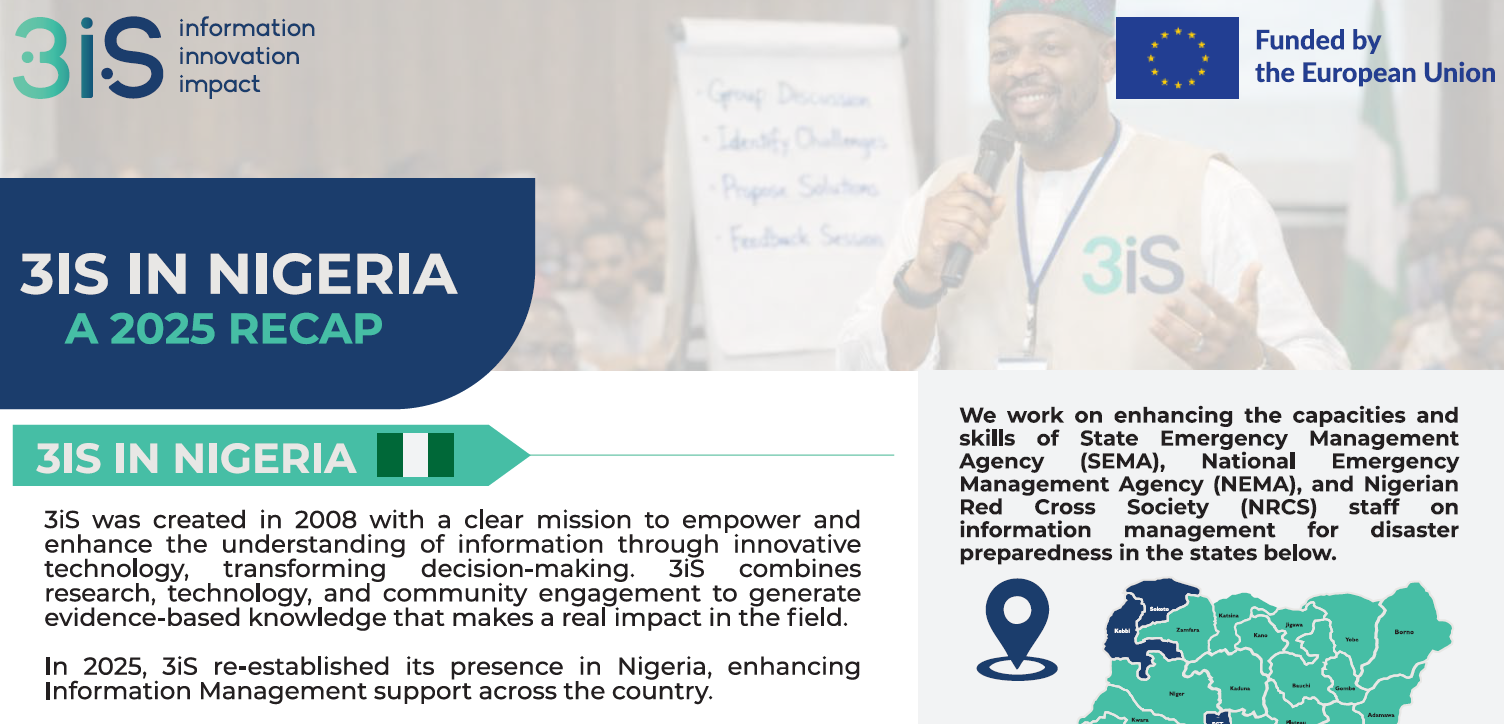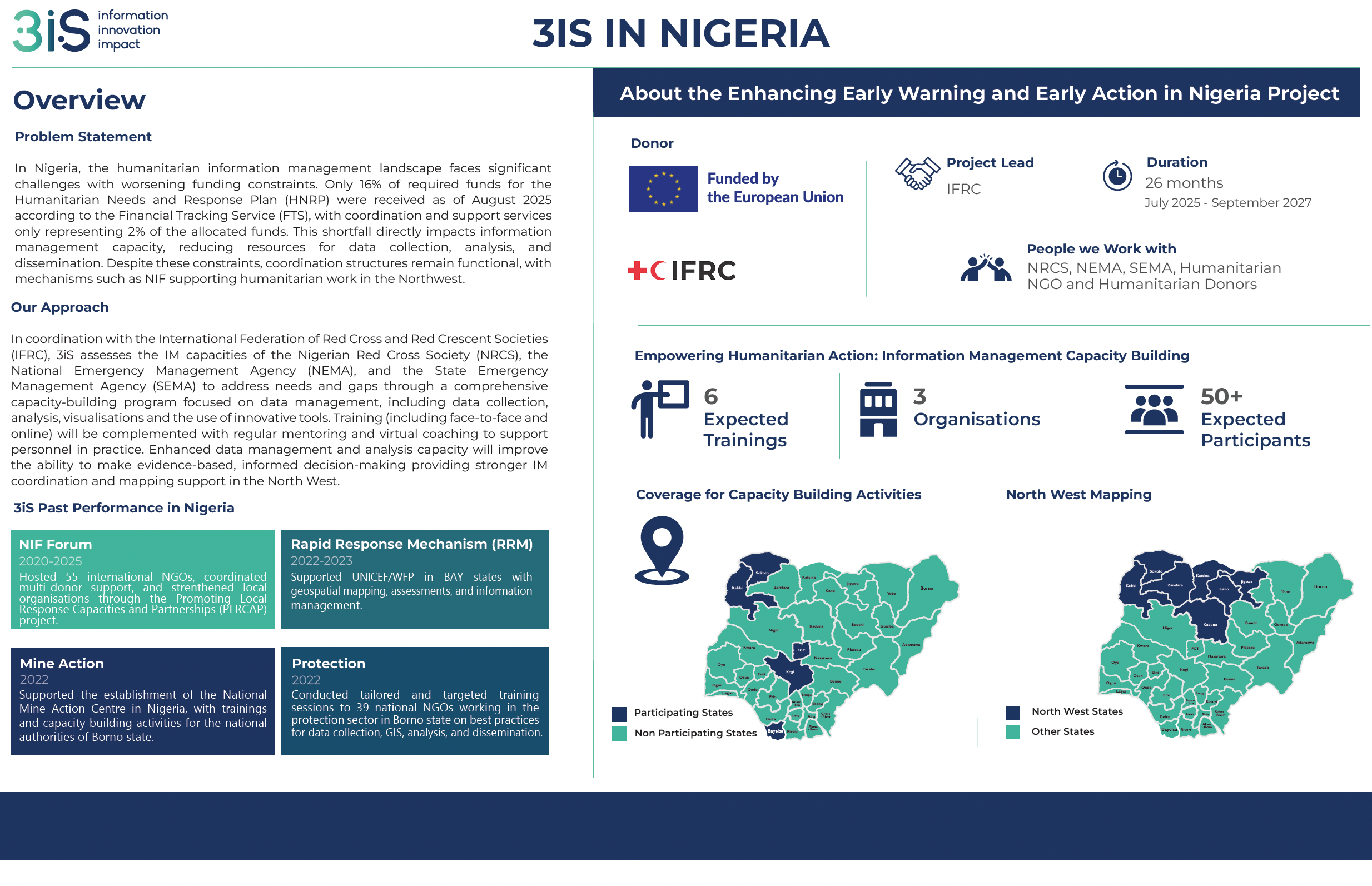Nigeria
Country Context
Nigeria faces a complex security crisis with escalating violence, terrorist activities with Boko Haram and the Islamic State West Africa Province, banditry, and ethno-communal conflicts causing mass casualties and displacement. Furthermore, climate threats impact the country and include drought in the Northwest and flooding in the East, affecting key agricultural regions and national food security.
According to the 2025 Humanitarian Needs and Response Plan, approximately 8.8 million people in Northern Nigeria require humanitarian assistance, including 4.9 million children. Two million people are internally displaced. An estimated 13-14 million people (5-10% of the population) require humanitarian food assistance with acute malnutrition levels registered nationwide.
3iS has been active in Nigeria since 2020 working on coordination as the host agency for the Nigeria INGO Forum (NIF), supporting the rapid response mechanism led by UNICEF and WFP with information management needs, as well as conducting capacity building for Mine Action in partnership with UNMAS and on protection through the Nigeria Humanitarian Fund.
The humanitarian information management landscape faces significant challenges with worsening funding constraints. Only 16% of required funds for the HNRP were received as of August 2025 (according to FTS), with coordination and support services only representing 2% of the allocated funds. This shortfall directly impacts information management capacity, reducing resources for data collection, analysis, and dissemination. Despite constraints, coordination structures remain functional, with mechanisms such as NIF supporting humanitarian work in the Northwest.
Contact us
nigeria@3is.org
Ongoing Projects
Collaborating with the International Federation of Red Cross and Red Crescent Societies (IFRC), 3iS is supporting efforts to enhance early warning and early action in Nigeria, with a strong focus on Information Management (IM).
As part of the ongoing initiative, 3iS is working with partners to:
• Support national authorities and the National Red Cross Society with IM capacity building, through planned trainings and technical support to strengthen skills in mitigating the impact of major disasters in the country.
• Provide humanitarian responders in the Northwest with IM support and mapping capacities, with preparations underway to deploy tools and methodologies that improve situational awareness and decision-making.
• The team will also support donors through funding mapping.
The project team works closely with partners, donors, and local authorities to ensure sustainability of actions and enable localization of humanitarian IM initiatives.
In June 2025, out of nearly 3,000 applicants, 3iS was one of 20 social impact organizations selected to receive funding, technical training, and dedicated expertise with support from Google experts as part of the Google.org Accelerator: Generative AI. Learn more about the program here: https://blog.google/outreach-initiatives/google-org/generative-ai-accelerator-cohort-2025/
3iS’ Agentic Risk & Environmental Management System (AREMS) is an intelligent multi-agent AI system backed by Google Cloud Platformed designed around community engagement. AREMS will allow for enhanced data-driven decision-making for humanitarian organizations and local authorities, alongside increased community resilience and ownership stemming from the co-creation of risk knowledge and chatbot-facilitated capacity building.
Past Performance
Between November 2020 and January 2025, 3iS served as the host agency of NIF – an alliance of 58 international NGOs providing humanitarian and development assistance in Nigeria – supported by multiple donors, including but not limited to DG ECHO, NRC, SDC, FCDO, BHA, and ShareTrust.
As the host agency, 3iS supported the Forum by ensuring strong compliance, efficient administration, and coordinated logistics. During this time, 3iS also worked on strengthening the capacity of local and national organizations working in Northeast Nigeria through the Promoting Local Response Capacities and Partnerships (PLRCAP) project, an initiative of NIF.
Between 2022-2023, 3iS supported the rapid response mechanism (RRM) led by UNICEF and WFP in responding to the needs of the displaced, returnee populations, and host families in Northeast Nigeria, especially in the BAY states (Borno, Adamawa, and Yobe).
3iS strengthened the RRM by closing critical IM gaps in emergency response efforts. We developed a geospatial mapping system, improving spatial decision-making and intervention tracking for UNICEF and other RRM partners in-country. 3iS also provided RRM partners with other IM support, including assessments and trainings, enhancing their ability to respond effectively to humanitarian crises in the region.
In 2022, in support of the establishment of the National Mine Action Centre in Nigeria, 3iS conducted trainings and capacity building activities for the national authorities of Borno state on the Information Management System for Mine Action (IMSMA) and data management.
These activities helped to support national authorities in meeting their obligations under Article 5 (Mine Clearence) of the Anti-Personnel Mine Ban Convention (APMBC), which entered into force for Nigeria on 1 March 2002.
In 2022, 3iS funded by the Nigerian Humanitarian Fund conducted tailored and targeted training sessions to 39 national NGOs working in the protection sector in Borno state on best practices for data collection, GIS, analysis, and dissemination.

